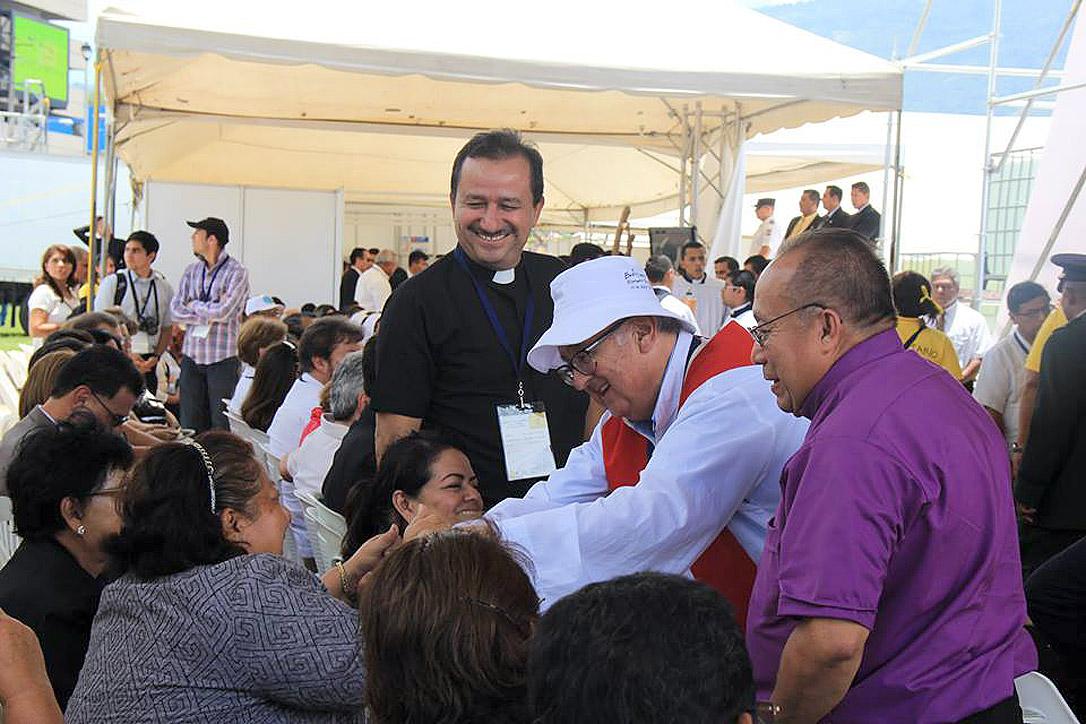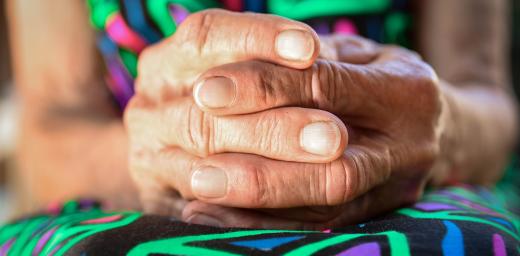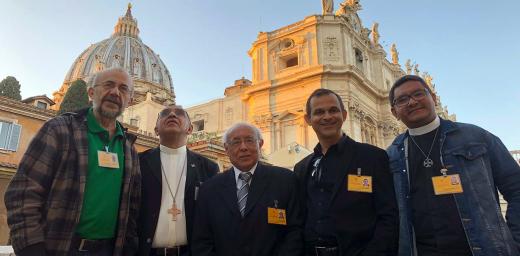Salvadoran Catholic Archbishop Romero: a friend and a great ecumenist

Bishop Medardo Gómez, right, watches theologian Pablo Richard greet Rev. Vilma RodrÃguez from the Salvadoran Lutheran Church, who took part in the beatification of assassinated Catholic Archbishop Oscar Romero. Photo: R. Menjivar
Lutheran Bishop Gómez reflects on Romero’s influence on the global church
SAN SALVADOR, El Salvador/GENEVA, 27 May 2015 (LWI) - Salvadoran Lutheran Bishop Medardo E. Gómez was among church leaders who witnessed the beatification of Roman Catholic Archbishop Oscar Romero at a ceremony attended by tens of thousands in the capital San Salvador on 23 May 2015. In an interview with Lutheran World Information, Gómez explained the significance of the global Catholic Church recognition of Romero. The bishop who was assassinated in March 1980 is considered a martyr of the Christian faith for his open advocacy for the poor and marginalized during El Salvador’s civil war, which lasted from 1979 to 1992.
What was your reaction to the invitation to attend the beatification ceremony of Archbishop Oscar Romero on 23 May?
I was worried when I heard the first reports from the Auxiliary Bishop that the ceremony would not have special guests because it would be a mass of the people. I thought it would not give an ecumenical testimony. However, my idea was to have an opportunity for ecumenical testimony, and I requested that together with me, 20 persons from other Lutheran churches and ecumenical partners in Latin America could participate. It was accepted.
It was a great event with the participation of many priests, bishops and national and ecumenical delegations. I am very happy because it was worthy to be held in that way. The Roman Catholic Church has a great opportunity to strengthen relationships. On the other hand, this event showed that sectors that were contrary to Monsignor Romero have changed. The Mayor of Santa Tecla announced that the city will erect a bust of Romero. This is a sign of change and recognition of Romero’s ministry.
For my part, I have given declarations expressing respect and admiration for Monsignor Romero. His beatification is a source of pride for Salvadorans. As a Christian church, it is important because Romero was very ecumenical. I have made known our Lutheran understanding that we all are saints by receiving the Holy Spirit and by receiving God’s forgiveness during baptism. So Romero's greatness is not for his actions, it is only God’s action in him that made Romero a prophet. This is a call of God to which Romero said: “here I am Lord.”
What was the significance of the presence of Lutheran church representatives from Latin America in the beatification ceremony?
Ecumenism is one of the subjects that has to be practiced. To give that testimony by participating in actions such as the beatification of Romero is important for me. It demonstrates to the world and sister churches the promotion and strengthening of the fact that we are brothers and sisters. I considered it a duty to participate, representing other churches and expressing fellowship with other faiths. Since the beatification was announced, I participated in many events preceding the ceremony on 23 May.
How does the Salvadoran Lutheran Church and you as it leader identify with the cause that he stood for and for which he was killed?
This moment excites me because Romero was my pastor too when I was a child being prepared in the catechism for confirmation, as he served as a pastor at the Cathedral of San Miguel. I remember well, not knowing at the time of his greatness—a man with joy and very communicative. Children were invited to memorize a Bible verse; he was a friend. Then, when I was at school, Romero was a chaplain and there is an experience that helps me to talk about his conversion. When the evangelical churches were growing, evangelical students in Romero’s class questioned the Bible class. He did not like it and attributed the resignation to the presence of evangelicals.
Romero was conservative while still being charismatic, and in his own way drawing people to the faith. The journey towards his role as bishop, along with the people, transformed him to embrace pastoral leadership in an ecumenical way.
When he was murdered, we were already having ecumenical meetings (for example, in the Baptist Church, for the prayer of Christian unity) in which Romero participated. The churches were already walking together. His death shocked us so much, especially me. The Salvadoran Lutheran Church was still small. The war started and we had suspended our meetings. With his death, many of us decided to take up the burden of Romero—the Episcopal Church, the Emanuel Baptist Church and others. At that time, I was about 33 years old.
In January 2012, on the 20th anniversary of the 1992 peace agreement, you wrote an open letter to President Mauricio Funes, calling for a new accord to return the country to the path of peace and social justice. What progress has been made?
In life I have learned that it is easier to build processes than rebuilding peace. The new government of El Salvador is rebuilding peace amidst the dominance of the traditional power. Its cost is huge but there is change. President Funes has a different approach; it is more democratic in fulfilling people’s dreams of respect and peace. He focuses on planning and establishing fairer systems to help the poor. The government has social services like access to free education up to high school (uniforms, food etc.), services to the elderly, health, etc. However, reconstruction has its costs; still, the dream of peace is being met.
How does the 2017 Reformation anniversary theme “Liberated by God’s Grace” speak to the Salvadoran Lutheran Church from the social and ecumenical perspectives?
The new mayor of San Salvador will receive me in June to discuss our church’s request to have a space (an evangelical square) to erect a bust of Martin Luther. I am sure that other ecumenical churches will also be pleased to participate in this initiative that is linked to the 500th anniversary of the Reformation. The purpose of our church is to make visible the Reformation not only from the Lutheran perspective but also ecumenically. We are promoting it through our pastoral work, sharing the historical and social elements of the Reformation especially in our family ministry.
Will Lutherans and Catholics commemorate together the 500th Reformation anniversary in 2017, and how?
We will have a meeting with Archbishop José Luis Escobar Alas, and hopefully with the Conference of Bishops, to talk about how to commemorate it. The Lutheran-Catholic document, From Conflict to Communion, will be of great importance for this proposal of a joint study. The important aspect is that both churches can see each other as brothers and sisters in dialogue. On the other hand, our pastor Cecilia Alfaro who is the national coordinator of the Council of Churches in Latin America has put the topic on the agenda. The ecumenical conversation is the space for dialogues with the Catholic Church.





